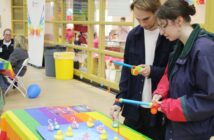
Elliott Nasby
To be drastic or to be idle.
In the context of worldwide environmental concerns, it seems the right mindset is the difference between progress and stagnation, but as Lehigh students we’ve bought ourselves some time. We’ve been given a place to experiment with new ideas and challenges, especially within the realm of sustainability.
Food, a multifaceted issue of sustainability, is one place to start. Luckily, Lehigh is joining in the effort in a way you might not know about. Over at Goodman Campus, where the athletes play and the crowds cheer, we have a community garden.
Well OK, what’s it for? Student projects? Environmental science majors? Don’t tell me they’re really trying to feed the entire school with a single parcel of organic real estate. Not quite.
Now, this story is not necessarily a lost one, but I’m afraid it may never have been told properly to begin with.
After all, the garden is tucked away in some tranquil patch of Goodman. Accessible, yes, but only to those who seek it out. In fact, I only found out about it through the SustainabLEHIGH preLUsion program I participated in, which consisted of about 15 students.
The meat of the garden lies in what it strives for, the ideas embodied that are: social cooperation, compassion, self-education, nutritious eating and community living. But thus far, the garden’s successes are largely parochial.
Installed in 2010, the garden offers students, faculty, enthusiasts and clubs a space to grow any sort of crop they’d like for a small fee and a promise to tend to it over the course of a growing season. But more importantly, the role of the space is to give access to the grassroots movement.
Back in my hometown of Orlando, Florida, there’s an organization called Fleet Farming that transforms dormant residential lawns into productive micro-farms. It’s incredibly local — the “fleet” actually travels by bike to the the 20 or so homes it services. But that’s the amazing part. Suddenly, the ponderous climatic crisis is not so colossal, now reduced to a manageable neighborhood street. Moreover, you become personally invested.
So, while climate change is a real problem, and we do need to create a sustainable future, it’s not about an overnight revolution. I’m certainly not here to be a Chicken Little or plea an activist’s case. I don’t even like to box all this into one concept of climate change because it feels so much more ingrained and subtle than that.
Tackling such a problem at the global scale is undoubtedly intimidating. Not limited to environmental issues, I’ve found myself much more inclined to feel strongly about something when there is a tangible personal connection. But as with most topics of debate, sides are taken and lines are drawn in a way that pushes people away.
One of the most effective mindsets I’ve seen in my personal experience is to simply see new things as means of self-informing. And doing so in a way that avoids any typecasting that might occur for someone who, say, becomes vegan or takes up organic farming. What happens is that you can choose the extent to which you incorporate other perspectives into your own lifestyle.
Lehigh, then, should be able to make similar connections. Why keep a community garden so hidden? If sustainability is truly at the core of the school’s future, would it not make sense to make it a more integral part of campus culture?
Even beyond a community garden and Bethlehem, we’re a university responsible for incredible strides in sustainability. Take Kelpÿ for example, the company repurposing marine kelp into snacks that not only taste good but also help keep our oceans clean. Or Bureo Inc. founded by a Lehigh alum to design skateboards out of recycled fishing nets. Come on, that’s pretty awesome.
It’s creative, it’s innovative, but even more than that, it’s fun. So, too, can our community garden be. But it starts with being informed and having conversations. So the grander visions of tomorrow like turning the UC Front Lawn into an organic farming oasis will have to wait.
For now, start small by perhaps making a trip out to see what’s blooming over at Goodman Campus, after this snow melts of course.
—
Elliott Nasby, ’20, is an assistant sports editor for The Brown and White. He can be reached at [email protected].





Comment policy
Comments posted to The Brown and White website are reviewed by a moderator before being approved. Incendiary speech or harassing language, including comments targeted at individuals, may be deemed unacceptable and not published. Spam and other soliciting will also be declined.
The Brown and White also reserves the right to not publish entirely anonymous comments.